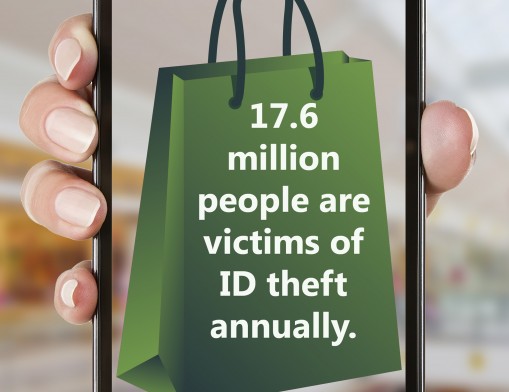Smartphone Safety Tips
Protecting your smartphone can save you from identity theft during the holidays.
By: Jocelyn Wood | Category: Financial Services | Issue: November 2016

Technology makes it easier for anytime, anywhere access to our finances; However, it also heightens the risk of identity theft.
This year, are you planning to do the majority of your shopping in store, on your computer or by phone?
Nearly 78 percent of all shoppers now use a smartphone. Of those shoppers, 44 percent are making purchases with their phone and 29 percent are making payments in store with their phones, according to 2016 UPS Pulse of the Online Shopper.
Technology is making anywhere, anytime access second nature, and as technology plays an increasing role in our everyday lives, so increases the risk of mobile identity theft.
Mobile identify theft is one of the fastest growing types of theft, which can be expected seeing how much time we spend on our phones, sending and reading texts, scouting products, monitoring social media, shopping and paying with our smartphones.
Here are seven ways to protect your mobile device:
1. Password protect all your devices. Don’t make the code easy. It may be a pain to log in each time, but it’s better than your personal information falling into the wrong hands.
2. Never purchase items or do your banking using public Wi-Fi. Public Wi-Fi is not secure, and your personal information – credit card and bank account numbers can be intercepted by hackers. Always assume someone is watching everything you do on public Wi-Fi because they probably are.
3. Learn how to remotely wipe your device, in case your phone is ever stolen or lost. Check with your service provider for details.
4. Keep your phone’s operating system and apps up-to-date. You may wish to consider malware protection software for your smartphones and tablets. Your mobile devices are computers and can become infected with malware. If you see a message telling you to download or upgrade your software, do some research first to make sure it’s not a fake message that will download malware.
5. Review your phone bills and look for sudden increases in data usage or third-party charges. These may be signs that your phone has been hacked.
6. Always download apps from trusted sources the App Store® for Apple devices and Google Play™ for all Android devices.
7. Communicate with caution – Be it email, text or online, what you say and post has the possibility of being hacked.
Protect Yourself.
RCB Bank
For more information, contact:
RCB Bank Online:
More about RCB Bank:
More ArticlesCurrent Coupons/OffersSubscribe
For Free!
